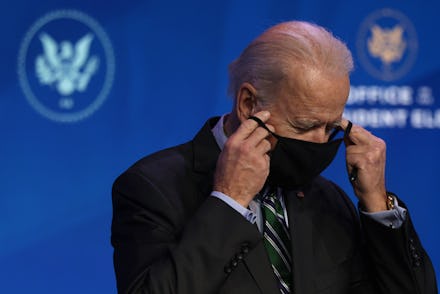Could Biden actually implement a national mask mandate?

If there is one item that's come to symbolize the coronavirus pandemic, it would be face masks. Early on, efforts to get people to accept and begin wearing masks were hampered by former President Donald Trump's infamous anti-mask agenda. With the inauguration President Biden, though, national messaging around masks is set to change; on his first day in office, he instituted a mask mandate on federal properties and urged all Americans to wear masks for 100 days. But will he be able to implement his long-promised national mask mandate?
Although masks should have been widely accepted as a tool to help slow down the spread of coronavirus, they were heavily politicized, much like the pandemic itself. Trump's anti-mask rhetoric trickled down throughout the federal government. In May, Vice President Mike Pence even visited Minnesota's Mayo Clinic without a mask, which he sort of, kind of apologized for. Trump himself was not seen publicly wearing a mask until mid-July, more than four months after the virus arrived with a fervor in the U.S. And in October, the Trump administration rejected a group of labor unions requesting a federal mask requirement to protect transit workers.
Biden, however, has occupied the opposite camp. After accepting the Democratic nomination for president in August, he proposed a national mask mandate as part of his plan to address the ongoing pandemic. During his convention speech, Biden said, "We’ll have a national mandate to wear a mask — not as a burden, but to protect each other. It’s a patriotic duty."
But creating a nation-wide mask mandate isn't actually something that Biden would have the authority to do, explains Lawrence Gostin, a professor at Georgetown University Law Center. "The president is not empowered to order a national mask mandate," Gostin tells Mic. "Moreover, public health powers are vested in the states. States could enact a statewide mask mandate, but not the president."
A similar argument was presented by James Phillips and John Yoo, law professors from Chapman University and the University of California at Berkeley, respectively, in The Orange County Register. The two professors said that while Congress could pass a law mandating masks for the president to sign and enforce, it's unlikely to happen. Overall, Phillips and Yoo wrote, "States have long had the primary duty to protect public health and safety, even during a pandemic, where the federal role remains limited to providing funds and supplies, lending technical expertise and medical research, and controlling the borders and interstate traffic."
While Biden previously said he would issue an executive order requiring masks on his first day as president, he also seems to have recognized the limitation of his authority as president and the role that states play. CNN reported that when asked to explain what his mask order would entail, his campaign pointed to comments Biden made on Oct. 23, when he stated, "First, I'll go to every governor and urge them to mandate mask-wearing in their states. And if they refuse, I'll go to the mayors and county executives and get local masking requirements in place nationwide."
Doing so seems to be Biden's best move, Gostin tells Mic. "The surest way to order individuals to wear masks is at the state level," he says. "President Biden should invite governors to the White House and urge state adoption of mask mandates. Congress could also provide incentives for states to enact such mandates."
Biden himself has acknowledged the limitations of his authority as president. On Dec. 29, he tweeted a short video about his first 100 days in office, saying he would simply "be asking" Americans to wear a mask. But notably, he said, "It's not a political statement, it's a patriotic duty. Our administration is going to require mask-wearing where I have the power to do so."
Biden went on to outline that this would include federal property, facilities, and interstate travel vessels like planes and trains. In addition, CNN outlined that the Department of Health and Human Services, or the CDC with HHS approval, could issue a mask mandate of their own. That's because the Public Health Service Act says that the health secretary can issue regulations if they're needed "to prevent the introduction, transmission, or spread of communicable diseases from foreign countries into the states or possessions, or from one state or possession into any other state or possession."
The CDC issuing its own mandate has been an option from the start of the pandemic. So nearly a year in, why hasn't it happened? As Gostin tells Mic, the CDC "has power to prevent interstate transmission of infectious diseases. But it is unlikely that the courts would uphold a national mandate. That would require Congress. And even Congress's power could be constrained by federalism. "
Ultimately, though, mask mandates may not be the solution. If you have a mandate, somebody needs to enforce it, and that would likely fall to law enforcement agencies. Given the United States's history of hyper-policing people of color, the communities bearing the brunt of the pandemic could become further criminalized under these mandates. We already saw disproportionate policing in the early days of the pandemic last spring, and as Mic reported in December, it's extremely difficult to actually interpret anti-mask violations under most U.S. law.